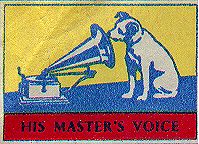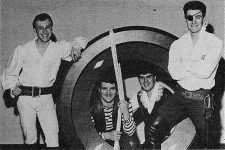| |
HMV
had already seen the Mike West Group with Heath at Wandsworth Town Hall but the
evening "was a disaster", however Ridley was asked to see the group perform in
Elstree.
"Peter
Sullivan my assistant introduced Freddie and the band to me. I was asked
to go out and hear them perform in Elstree. The performance took place
in a corrugated sheet hall. I couldn't believe what went on there
because I couldn't hear anything. It was just a loud, howling, metallic
noise and this went on for two and a half hours. When I walked out my
head was going ga-ga-ga. I thought this can't be true, it's just not on.
Anyway, I met Freddie Heath who, as it happens, was an absolute lamb. He
was a little darling. I became very fond of that boy."
Kidd had written a batch of songs,
one of which, the classic "Please Don't Touch" became their first
single and first hit. Kidd & his various line ups developed one of the hottest
live acts of the period and one whose sound anticipated much of what was to come
through the first six or seven years of the 1960's. Despite this early
breakthrough HMV and Ridley were never quite sure what to do with Kidd - for
example; the all-important follow-up to his debut hit was the old music hall number "If You Were The Only
Girl In The World". Although a popular crooned number on stage it died a death on
vinyl and is one of his more collectable singles today. Bing Crosby Kidd certainly wasn't. His classic no. 1 "Shakin'
All Over" is undeniably the most revived English rock 'n roll original of the
pre-Beatles era, however even that started off as a hurriedly composed b-side to
another dusted-off ancient relic from the golden days of Variety. Some of Kidd's
best r&b sides remained unreleased in favour of technically superb, pleasant
pop-rock singles during his time on the label, some of which just didn't suit
the true, native British r&b-voiced singer.
Once the rock 'n' roll landscape had
been transformed by the Beatles it became apparent where Ridley and HMV had got
it wrong with Kidd. In the Mop Tops wake he signed the Swinging Blue Jeans, one of the better acts of their
era who deserved more success. Their last hit was in 1966 when the face of pop
was about to fundamentally change and Ridley found himself unable to follow
their success with any rock act nearly as promising or successful. The same year
the hugely successful Manfred Mann defected to Philips minus singer Paul Jones
whose hits quickly petered out. By the end of the decade Ridley was still producing MOR pop artists like
singer Ronnie Hilton, recording ditties like "Glory Glory Leeds
United" b/w "We Shall Not Be Moved". Into the early 1970's HMV's
successes were limited to cast recordings and some notable comedy records by Peter Sellers and veteran music hall
comedian Benny Hill.
By the time of the Queen's
Silver Jubilee in 1977, HMV had ceased to exist as a label (although the name
and famous logo are still found on Britain's high streets) and Ridley's 28-year
career with EMI had seen him compose over 200 songs and win two Ivor Novello
Awards for his contribution to the British entertainment industry. Ironically,
he retired the same year, just as Benny Hill's bawdy music-hall style of comedy
broke him big as an international television star, which created a new demand
for his records. He still produced occasionally, notably with the "Love Is
Jose Carreras" album on Philips which became a hit during 1984.
Ultimately,
Walter J. Ridley
will be best remembered amongst the rock 'n' roll fraternity for his Johnny Kidd
and Swinging Blue Jeans recordings, especially with new compilations first on
LP, then CD from the 1970's onward. Both of those groups (as well as Alma Cogan's
music) have become the objects of extensive CD reissues in the 1980's and 1990's by EMI and other
labels, most notably Colin Miles on his See For Miles label who have ensured
that most of Kidd's unreleased R&R/R&B gems finally saw the light of
day. Other artists produced on HMV/EMI
under Walter Ridley included Malcolm
Vaughan, Ronnie
Hilton, Alma
Cogan. |
|


